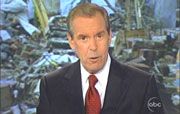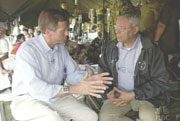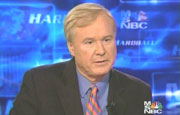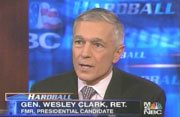|
1. Jennings Blames 9/11 Limits for Stinginess of "Muslim Charities"
Peter Jennings: Blame America for the low level of Muslim donations for tsunami relief. On Tuesday, CNN's Octavia Nasr reported that "Arab countries are at the bottom of the list" of those pledging relief. She noted how "Saudi Arabia has pledged $30 million" and contrasted it with "the $155 million raised in 2002" in a "telethon on Saudi TV for families of Palestinian suicide bombers." A few hours later, on Tuesday's NBC Nightly News, Kerry Sanders pointed out how "there's a growing debate in the Arab world whether oil-rich nations have done enough to help fellow Muslims. Contributions from Saudi Arabia, Kuwait and Qatar have been relatively small." But on Wednesday's World News Tonight on ABC, Jennings managed to hold the U.S. accountable for the Muslim stinginess: "In the oil-rich countries of the Persian Gulf, citizens are being urged to do more. Indonesia is a largely Muslim nation. Ironically, the controls on Muslim charities after 9/11 may be keeping contributions down."
2. Williams: World Will See U.S. as Anti-Iraq War Activists Wished
NBC Nightly News anchor Brian Williams managed to fold a benevolent spin, on why those against the Iraq war opposed it, into a convoluted question to Secretary of State Colin Powell about the image of the U.S. in the Muslim world. As the two sat Wednesday in a medical aid tent in Bande Aceh area of Indonesia, Williams proposed: "Those folks back in the states who were against the war in Iraq said, 'you know, we should have a different approach toward Muslims around the world, show a different face of the United States.' Is it a strange outgrowth of a disaster that people will see now this face of the United States?"
3. 9 Days Later, Jennings Still Hits "Insufficient" U.S. Response
On the day USA Today ran a story in which ABC News reporter and anchor Bob Woodruff conceded that "everyone," including journalists, were "slow to completely grasp the significance" of the tsunami disaster, ABC's Peter Jennings, more than a week after the U.S. government improved upon its initial response, still obsessed over emphasizing U.S. shortcomings. Jennings reminded Tuesday World News Tonight viewers: "The U.S., as you know, had faced some criticism that its initial response to the crisis was insufficient." Jennings then re-played a segment of an interview with Colin Powell by Diane Sawyer from Good Morning America in which she forwarded how "there's all kinds of second-guessing going on that America missed a great opportunity, particularly in intensely Muslim areas, to show good faith in the beginning."
4. MSNBC's Matthews Frets that Bush Didn't Ask for Carter's Help
You knew someone in the media would do it: Complain that President George W. Bush illogically overlooked Jimmy Carter in picking former Presidents Bill Clinton and George H.W. Bush to spearhead private fundraising efforts for tsunami relief. MSNBC's Chris Matthews fulfilled the expectation on Tuesday's Hardball when he pressed Wesley Clark about whether he found it "odd" that "the former President who's had the most role to play in the last 20 years in terms of helping poor nations with disease and problems of, like this, smaller versions of it, Jimmy Carter was not asked to participate?" Though Clinton is a Democrat, Matthews nonetheless, asked: "Do you think it was partisan knocking Carter off the list?"
 Jennings Blames 9/11 Limits for Stinginess Jennings Blames 9/11 Limits for Stinginess
of "Muslim Charities"
 Peter Jennings: Blame America for the low level of Muslim donations for tsunami relief. On Tuesday, CNN's Octavia Nasr reported that "Arab countries are at the bottom of the list" of those pledging relief. She noted how "Saudi Arabia has pledged $30 million" and contrasted it with "the $155 million raised in 2002" in a "telethon on Saudi TV for families of Palestinian suicide bombers." A few hours later, on Tuesday's NBC Nightly News, Kerry Sanders pointed out how "there's a growing debate in the Arab world whether oil-rich nations have done enough to help fellow Muslims. Contributions from Saudi Arabia, Kuwait and Qatar have been relatively small." But on Wednesday's World News Tonight on ABC, Jennings managed to hold the U.S. accountable for the Muslim stinginess: "In the oil-rich countries of the Persian Gulf, citizens are being urged to do more. Indonesia is a largely Muslim nation. Ironically, the controls on Muslim charities after 9/11 may be keeping contributions down."
Peter Jennings: Blame America for the low level of Muslim donations for tsunami relief. On Tuesday, CNN's Octavia Nasr reported that "Arab countries are at the bottom of the list" of those pledging relief. She noted how "Saudi Arabia has pledged $30 million" and contrasted it with "the $155 million raised in 2002" in a "telethon on Saudi TV for families of Palestinian suicide bombers." A few hours later, on Tuesday's NBC Nightly News, Kerry Sanders pointed out how "there's a growing debate in the Arab world whether oil-rich nations have done enough to help fellow Muslims. Contributions from Saudi Arabia, Kuwait and Qatar have been relatively small." But on Wednesday's World News Tonight on ABC, Jennings managed to hold the U.S. accountable for the Muslim stinginess: "In the oil-rich countries of the Persian Gulf, citizens are being urged to do more. Indonesia is a largely Muslim nation. Ironically, the controls on Muslim charities after 9/11 may be keeping contributions down."
Jennings offered no source or authority for his theory which aired over video of kids scooping rice into bowls and came in the middle of a series of tsunami items he read -- between how President Bush donated $10,000 and how European nations held a three-minute moment of silence.
CNN offered a less sympathetic take on Arab stinginess, the MRC's Ken Shepherd noticed. At about 3:30pm EST on Tuesday, January 4, CNN turned to Octavia Nasr, senior editor for Arab affairs at CNN. She asserted:
"When it comes to aid pledges from nations around the world, Arab countries are at the bottom of the list. Saudi Arabia has pledged $30 million. Compare that to the $155 million raised in 2002 at this telethon on Saudi TV for families of Palestinian suicide bombers. Prince al Walid bin Talal donated $27 million out of his own pocket to that fund-raiser.
"In Arabic chat rooms, a genuine anger at Arab governments and Arab media alike. An Arab talk show host says, 'many Arab viewers have become racist. Unfortunately, the tragedy that befell Asians has no effect on many of them.' An Arab intellectual writes, 'This is the chance for to show their humanity regardless of race, ethnicity or religion, giving just because it is the right thing to do.' At least the Emirate of Dubai has made a start. This shipment of clean drinking water has already made it to Sri Lanka. And a walk-a-thon is planned for Thursday to raise funds for tsunami victims..."
NBC Nightly News on Tuesday, the MRC's Brad Wilmouth observed, also took up the issue. In a story on how the Arab media are discrediting U.S. aid efforts, Kerry Sanders noted: "At the same time, there's a growing debate in the Arab world whether oil-rich nations have done enough to help fellow Muslims. Contributions from Saudi Arabia, Kuwait and Qatar have been relatively small. Compare that to Japan, the largest contributor."
Abdel Bari Atwan, Al Quds Al Arabi newspaper: "I cannot explain it. I think it is a lack of sense, lack of conscious. It is stupidity, to be honest."
Sanders suggested religious intolerance as the cause: "Some arguing they won't donate more, fearing the money will fall into the hands of infidels."
  Williams: World Will See U.S. as Anti-Iraq Williams: World Will See U.S. as Anti-Iraq
War Activists Wished
NBC Nightly News anchor Brian Williams managed to fold a benevolent spin, on why those against the Iraq war opposed it, into a convoluted question to Secretary of State Colin Powell about the image of the U.S. in the Muslim world. As the two sat Wednesday in a medical aid tent in Bande Aceh area of Indonesia, Williams proposed: "Those folks back in the states who were against the war in Iraq said, 'you know, we should have a different approach toward Muslims around the world, show a different face of the United States.' Is it a strange outgrowth of a disaster that people will see now this face of the United States?"
Of course, many would argue that ousting Saddam Hussein and the Taliban has benefitted the Muslims in those countries, not to mention how the U.S. earlier went to war in Kosovo to protect Muslims.
Williams led the January 5 NBC Nightly News with his "exclusive" interview with Powell who has been doing interviews with many media outlets.
 As the two sat in a medical aid tent, with much activity behind them, Williams delivered this as his second question:
As the two sat in a medical aid tent, with much activity behind them, Williams delivered this as his second question:
"Here you are, the American Secretary of State, sitting in a tent in the one nation in the world with the largest Muslim population. Those folks back in the states who were against the war in Iraq said 'you know, we should have a different approach toward Muslims around the world, show a different face of the United States.' Is it a strange outgrowth of a disaster that people will see now this face of the United States?"
Powell: "People will judge us by what we end up accomplishing. And the anti-American feeling that we have seen in various parts of the world over the past year and a half will start to dissipate. I still think there's a reservoir of good toward America and toward Americans..."
  9 Days Later, Jennings Still Hits "Insufficient" 9 Days Later, Jennings Still Hits "Insufficient"
U.S. Response
On the day USA Today ran a story in which ABC News reporter and anchor Bob Woodruff conceded that "everyone," including journalists, were "slow to completely grasp the significance" of the tsunami disaster, ABC's Peter Jennings, more than a week after the U.S. government improved upon its initial response, still obsessed over emphasizing U.S. shortcomings. Jennings reminded Tuesday World News Tonight viewers: "The U.S., as you know, had faced some criticism that its initial response to the crisis was insufficient." Jennings then re-played a segment of an interview with Colin Powell by Diane Sawyer from Good Morning America in which she forwarded how "there's all kinds of second-guessing going on that America missed a great opportunity, particularly in intensely Muslim areas, to show good faith in the beginning."
Jennings' second story on the January 4 World News Tonight: "The U.S., as you know, had faced some criticism that its initial response to the crisis was insufficient. ABC's Diane Sawyer talked to the Secretary of State in Thailand today."
Diane Sawyer: "I know that you have just said that there will not be a Marshall Plan-scale contribution, that would not be necessary here, but is $350 million enough?"
Sawyer's second question: "There's all kinds of second-guessing going on that America missed a great opportunity, particularly in intensely Muslim areas, to show good faith in the beginning."
Powell: "Hang on, hang on. A little while ago the Thai foreign minister and I gave a press conference and what he said was the first person to call him, the first person to call the Thai government was me, last Sunday night. And I said to him, 'What do you need?'"
For how the January 4 GMA handled the interview, see the January 4 CyberAlert: www.mediaresearch.org
Maybe ABC should spend as much time looking at its own news judgments. In a January 4 "Media Mix" column in USA Today, "A late start on tsunami story," Peter Johnson observed: "Monday, nine days after a deadly tsunami cut a wide swath across Asia, network news stars such as NBC's Brian Williams, ABC's Diane Sawyer and CBS' Dan Rather finally began reporting from the region, a startling length of time given the scope of the tragedy."
He quoted ABC's own Bob Woodruff: "'This is one of those stories nobody quite understood in the first couple of days exactly what this was going to be,' says ABC News correspondent Bob Woodruff, reporting Monday from Colombo, Sri Lanka. 'The White House didn't understand it, journalists didn't understand it, and aid organizations didn't understand it. Now, more and more reporters are wandering into the story. But everyone was slow to completely grasp the significance.'"
For the January 4 USA Today article in full: www.usatoday.com
  MSNBC's Matthews Frets that Bush Didn't MSNBC's Matthews Frets that Bush Didn't
Ask for Carter's Help
 You knew someone in the media would do it: Complain that President George W. Bush illogically overlooked Jimmy Carter in picking former Presidents Bill Clinton and George H.W. Bush to spearhead private fundraising efforts for tsunami relief. MSNBC's Chris Matthews fulfilled the expectation on Tuesday's Hardball when he pressed Wesley Clark about whether he found it "odd" that "the former President who's had the most role to play in the last 20 years in terms of helping poor nations with disease and problems of, like this, smaller versions of it, Jimmy Carter was not asked to participate?" Though Clinton is a Democrat, Matthews nonetheless, asked: "Do you think it was partisan knocking Carter off the list?"
You knew someone in the media would do it: Complain that President George W. Bush illogically overlooked Jimmy Carter in picking former Presidents Bill Clinton and George H.W. Bush to spearhead private fundraising efforts for tsunami relief. MSNBC's Chris Matthews fulfilled the expectation on Tuesday's Hardball when he pressed Wesley Clark about whether he found it "odd" that "the former President who's had the most role to play in the last 20 years in terms of helping poor nations with disease and problems of, like this, smaller versions of it, Jimmy Carter was not asked to participate?" Though Clinton is a Democrat, Matthews nonetheless, asked: "Do you think it was partisan knocking Carter off the list?"
The MRC's Geoff Dickens tracked down the exchange from the January 4 Hardball:
Matthews: "Do you find it odd that the President, the former President who's had the most role to play in the last 20 years in terms of helping poor nations with disease and problems of, like this, smaller versions of it, Jimmy Carter was not asked to participate? Do you find that interesting?"
 Retired General and former Democratic presidential candidate Wesley Clark: "Well I think it's, it's a terrible thing that he wasn't asked to participate and, and I'm sure that President Carter is going to do everything he can to help this effort." Retired General and former Democratic presidential candidate Wesley Clark: "Well I think it's, it's a terrible thing that he wasn't asked to participate and, and I'm sure that President Carter is going to do everything he can to help this effort."
Matthews: "Do you think it was partisan knocking Carter off the list?"
Clark: "I don't know if it was partisan or not but I'll tell you what, Jimmy Carter's held in very, very high esteem around the world. I've had people from every walk of life around the world tell me how much they think of President Carter. So it's in our country's interest that we put President Carter out there on the line as one of America's great representatives."
-- Brent Baker,
still recovering at home

Home | News Division
| Bozell Columns | CyberAlerts
Media Reality Check | Notable Quotables | Contact
the MRC | Subscribe
|





















 Peter Jennings: Blame America for the low level of Muslim donations for tsunami relief. On Tuesday, CNN's Octavia Nasr reported that "Arab countries are at the bottom of the list" of those pledging relief. She noted how "Saudi Arabia has pledged $30 million" and contrasted it with "the $155 million raised in 2002" in a "telethon on Saudi TV for families of Palestinian suicide bombers." A few hours later, on Tuesday's NBC Nightly News, Kerry Sanders pointed out how "there's a growing debate in the Arab world whether oil-rich nations have done enough to help fellow Muslims. Contributions from Saudi Arabia, Kuwait and Qatar have been relatively small." But on Wednesday's World News Tonight on ABC, Jennings managed to hold the U.S. accountable for the Muslim stinginess: "In the oil-rich countries of the Persian Gulf, citizens are being urged to do more. Indonesia is a largely Muslim nation. Ironically, the controls on Muslim charities after 9/11 may be keeping contributions down."
Peter Jennings: Blame America for the low level of Muslim donations for tsunami relief. On Tuesday, CNN's Octavia Nasr reported that "Arab countries are at the bottom of the list" of those pledging relief. She noted how "Saudi Arabia has pledged $30 million" and contrasted it with "the $155 million raised in 2002" in a "telethon on Saudi TV for families of Palestinian suicide bombers." A few hours later, on Tuesday's NBC Nightly News, Kerry Sanders pointed out how "there's a growing debate in the Arab world whether oil-rich nations have done enough to help fellow Muslims. Contributions from Saudi Arabia, Kuwait and Qatar have been relatively small." But on Wednesday's World News Tonight on ABC, Jennings managed to hold the U.S. accountable for the Muslim stinginess: "In the oil-rich countries of the Persian Gulf, citizens are being urged to do more. Indonesia is a largely Muslim nation. Ironically, the controls on Muslim charities after 9/11 may be keeping contributions down." 
 As the two sat in a medical aid tent, with much activity behind them, Williams delivered this as his second question:
As the two sat in a medical aid tent, with much activity behind them, Williams delivered this as his second question: 

 You knew someone in the media would do it: Complain that President George W. Bush illogically overlooked Jimmy Carter in picking former Presidents Bill Clinton and George H.W. Bush to spearhead private fundraising efforts for tsunami relief. MSNBC's Chris Matthews fulfilled the expectation on Tuesday's Hardball when he pressed Wesley Clark about whether he found it "odd" that "the former President who's had the most role to play in the last 20 years in terms of helping poor nations with disease and problems of, like this, smaller versions of it, Jimmy Carter was not asked to participate?" Though Clinton is a Democrat, Matthews nonetheless, asked: "Do you think it was partisan knocking Carter off the list?"
You knew someone in the media would do it: Complain that President George W. Bush illogically overlooked Jimmy Carter in picking former Presidents Bill Clinton and George H.W. Bush to spearhead private fundraising efforts for tsunami relief. MSNBC's Chris Matthews fulfilled the expectation on Tuesday's Hardball when he pressed Wesley Clark about whether he found it "odd" that "the former President who's had the most role to play in the last 20 years in terms of helping poor nations with disease and problems of, like this, smaller versions of it, Jimmy Carter was not asked to participate?" Though Clinton is a Democrat, Matthews nonetheless, asked: "Do you think it was partisan knocking Carter off the list?"  Retired General and former Democratic presidential candidate Wesley Clark: "Well I think it's, it's a terrible thing that he wasn't asked to participate and, and I'm sure that President Carter is going to do everything he can to help this effort."
Retired General and former Democratic presidential candidate Wesley Clark: "Well I think it's, it's a terrible thing that he wasn't asked to participate and, and I'm sure that President Carter is going to do everything he can to help this effort."